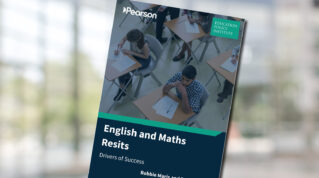The government has published long-awaited draft transgender guidance, which sets out how schools and colleges should respond to gender-questioning students.
The draft guidance has been published alongside a consultation on the proposals. The guidance is non-statutory, meaning colleges will not have a legal duty to follow it.
The guidance applies to students aged under 18 in further education and sixth-form colleges, as well as schools. However, confusingly, the guidance interchangeably described gender-questioning students in colleges as “students,” “pupils,” and “children.”
It does not apply to independent training providers, even those delivering apprenticeships or study programmes to under-18s.
The Department for Education said it had adopted a “parent-first approach”, and that the guidance would advise colleges to involve parents in decisions affecting their children.
The Sixth Form Colleges Association (SFCA) said there were “omissions from the [earlier] draft guidance published today relating to the college age group” which they said they’d feed back in their consultation response.
Noni Csogor, SFCA’s senior research and policy manager, said the guidance “provides colleges with some much-needed clarity on a complex and sensitive issue.”
“The lengthy delay in publication has resulted in great confusion, with conflicting advice from legal and other sources filling the vacuum. All colleges want to continue providing welcoming, inclusive environments for trans and gender-questioning students, as well as fulfilling their safeguarding obligations, and we’ll highlight how this can best be achieved through our response to the consultation,” Csogor said.
David Hughes, chief executive of the Association of Colleges, said the guidance was “tricky territory” for colleges.
“Colleges are often the first safe place where young people can truly start to work out who they are, and to express themselves freely. We are proud of that and of the brilliant work colleges do in supporting students of all ages. It is important that any guidance therefore has the wellbeing of students at its core, helps colleges in practical ways to support all students, and recognises what students tell staff about their identities,” he said.
AELP declined to comment.
Here’s what the draft guidance states. It won’t come into effect until after the consultation, and may be changed at that point.
1. Five ‘overarching’ principles
The guidance focuses on how colleges should handle requests for “social transitioning”.
The DfE defines this as “actions such as changing names, uniforms, or using
different facilities to help a child appear more like the opposite sex, with the expectation
that they will be treated as if they are”.
The guidance sets out five “overarching principles” for colleges to frame responses to requests for social transitioning. These are as follows…
- Schools and colleges have statutory duties to safeguard and promote the welfare of all children
- Schools and colleges should be respectful and tolerant places where bullying is never tolerated
- Parents should not be excluded from decisions taken by a school or college relating to requests for a child to ‘socially transition’
- Schools and colleges have specific legal duties that are framed by a child’s biological sex
- There is no general duty to allow a child to ‘social transition’
2. When should colleges involve parents?
The guidance states that where a student requests action from a college in relation to “any degree” of social transition, colleges should speak to parents “as a matter of priority” and encourage the student to speak to their parents.
The DfE would “expect parental consent to be required in the vast majority of cases”.
But in “exceptionally rare circumstances”, where a college believes involving parents could put a student at “significant risk” of harm, colleges do not have to inform them.
If no change is being requested, the DfE says teachers can “listen respectfully” to a student’s feelings without automatically telling their parents. But for safeguarding reasons, they cannot “promise confidentiality”.
3. What to do about pronouns
The draft guidance states that primary children “should not have different pronouns to their sex-based pronouns used about them”.
For older children and students, schools and colleges should only agree “if they are confident that the benefit to the individual child outweighs the impact on the school [sic] community”.
As a result, the government says it expects “there will be very few occasions in which a school or college will be able to agree to a change of pronouns”.
4. Don’t ‘compel’ others to use pronouns
In those instances where a change of pronouns is agreed, “no teacher or pupil should be compelled to use these pronouns”.
Colleges should also not prevent teachers from referring to children collectively as ‘girls’ or ‘boys’, even in the presence of a child who has been allowed to change their pronouns.
Colleges are also told they should “exhaust all other options”, such as using first names, “to avoid requiring individuals having to use preferred pronouns”.
The guidance adds that no student should be sanctioned for “honest mistakes” when adapting to preferred names or pronouns.
5. Take a ‘cautious approach’
The guidance warns “a cautious approach” should be taken that complies with legal duties, because there isn’t “definitive evidence” of the long and short-term impact of changes on young people.
The guidance states that colleges must record a student’s sex accurately “wherever it is recorded.”
Government also expects schools to make “all relevant staff” aware of the biological sex of a child questioning their gender. The wording of the guidance does not make it clear whether this also applies to colleges.
6. Wait before considering a request
Colleges are also told to allow for “watchful waiting” before considering a request, “to ensure it is a sustained and properly thought-through decision”.
They should consider if the student has made “similar requests” before, and seek to understand factors that may have influenced the student, such as their “peers or social media”.
The guidance also asks colleges to consider whether a student feels “pressured” to identify differently because they “simply do not align” with stereotypes associated with their sex.
Other factors listed for consideration are whether input from a special educational needs coordinator is “appropriate”, or if there is an “interaction” with the child’s sexual orientation.
7. Factoring in other students and staff
When considering requests for social transitioning, colleges are told to consider the impact on other students, including safeguarding concerns.
Colleges may conclude that the impact on the college community “is such that it may not be possible to agree to support a request”.
If a change has been agreed, colleges should communicate this to other students and staff “where it is necessary and proportionate to do so”.
But the guidance adds that “this should be done sensitively, without implying contested views around gender identity are fact”.
8. What happens with single-sex spaces?
Responding to a request to support any degree of social transition “must not” include allowing access to single-sex spaces, the guidance states.
“All children” should use the toilets, showers and changing facilities designated for their biological sex “unless it will cause them distress to do so”, the DfE said.
If a college wishes to offer a student access to an alternative toilet facility, they should be secured from the inside and for use by one student at a time, including for hand washing.
Alternative changing rooms could include a facility to be used by one student at a time and lockable from the inside.
9. Clear rules needed for sports
Colleges should adopt “clear rules which mandate separate-sex participation” for all sports “where physical differences” between sexes “threatens the safety of children”.
Colleges are advised to consider guidance from each sport’s national governing body when making decisions on fairness and safety, the guidance states.
“It would not be safe for a biological boy to participate in certain sports as part of a teenage girls’ team,” it stated.
And even in sports where “safety is not risked”, such as competitive sports, colleges should be aware that without separate sex participation, “it is unlikely that they will be offering equal opportunities”.
















Your thoughts